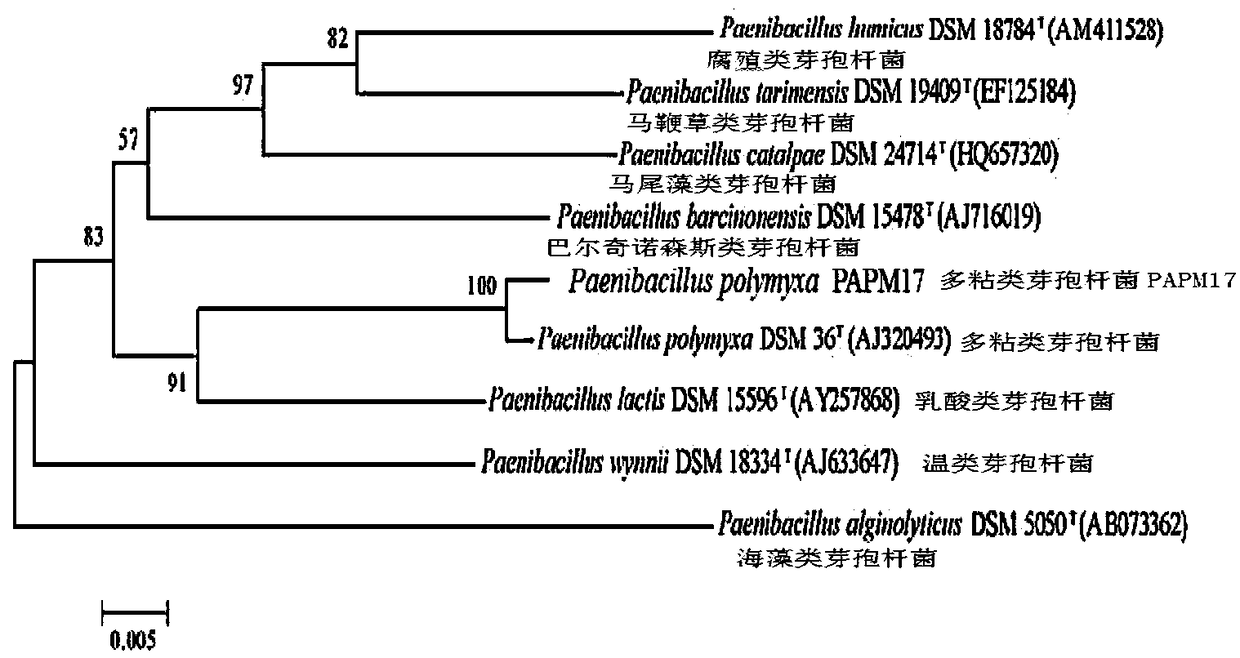Paenibacillus polymyxa with saline-alkali resistant effect and application thereof
A polymyxa-like, salt-alkali-resistant technology, applied in the field of agricultural biology, to achieve strong salt-alkali tolerance, promote plant growth, and reduce continuous cropping obstacles
- Summary
- Abstract
- Description
- Claims
- Application Information
AI Technical Summary
Problems solved by technology
Method used
Image
Examples
Embodiment 1
[0025] Example 1: Screening of Paenibacillus polymyxa PAPM17
[0026] Paenibacillus polymyxa PAPM17 was isolated from cotton rhizosphere soil in saline-alkali land. The soil was sampled in Yongan Town, Kenli District, Dongying City, Shandong Province, which was a saline-alkali soil where cotton had been planted continuously for more than 5 years. The specific separation method is as follows: weigh 5 g of the mixed soil sample, put it into 100 mL of enrichment medium, and culture it with shaking at 37°C and 150 rpm for 5 days. Take 1 mL of the enriched culture for 10 -1 ~10 -5 Serial dilution, then take 10 -3 、10 -4 、10 -5 The three dilutions were spread on the plate containing the selection medium, and cultured at 37°C for 5 days. Single colonies were picked and streaked onto plates containing selection medium, and cultured at 37°C for 5 days. Pick a single colony and transfer it to the slant of the preservation medium test tube, culture it at 37°C for 2 days, and after...
Embodiment 2
[0033] Example 2: Identification of Paenibacillus polymyxa PAPM17
[0034] (1) Morphological and physiological and biochemical characteristics
[0035] The morphological characteristics of the PAPM17 strain are: cultured at 37°C for 36 hours on a nutrient agar medium, the colony is milky white, round, raised, shiny, smooth, moist, sticky, with neat edges, and difficult to pick; Rod-shaped, Gram-positive, spore-forming, oval-shaped spores, not enlarged, and without paraspore crystals. The formula of the nutrient agar medium is 10 g of peptone, 3 g of beef extract, 5 g of NaCl, 20 g of agar, 1000 ml of water, and pH 7.5.
[0036] The physiological and biochemical characteristics of the PAPM17 strain are: negative indole test, positive nitrate reduction test, positive v-p test, positive casein hydrolysis test, positive starch hydrolysis test, positive 5% NaCl test, positive L-arabinose test, D - Positive glucose test, positive D-xylose test, negative citrate utilization test, p...
Embodiment 3
[0040] Example 3 Degradation test of Paenibacillus polymyxa PAPM17 to gallic acid, p-hydroxybenzoic acid and ferulic acid
[0041] Prepare a medium containing p-hydroxybenzoic acid, its formula is: p-hydroxybenzoic acid 1000mg, peptone 5g, ammonium sulfate 0.5g, magnesium sulfate 0.1g, potassium chloride 0.2g, sodium chloride 0.5g, water 1000ml, pH 7.5 .
[0042] A culture medium containing gallic acid was prepared, and its formula was: 1000 mg of gallic acid, 5 g of peptone, 0.5 g of ammonium sulfate, 0.1 g of magnesium sulfate, 0.2 g of potassium chloride, 0.5 g of sodium chloride, 1000 ml of water, and pH 7.5.
[0043] A culture medium containing ferulic acid was prepared, and its formula was: 1000 mg of ferulic acid, 5 g of peptone, 0.5 g of ammonium sulfate, 0.1 g of magnesium sulfate, 0.2 g of potassium chloride, 0.5 g of sodium chloride, 1000 ml of water, and pH 7.5.
[0044] Paenibacillus polymyxa PAPM17 was transferred into the above-mentioned three kinds of medium, ...
PUM
 Login to View More
Login to View More Abstract
Description
Claims
Application Information
 Login to View More
Login to View More - R&D
- Intellectual Property
- Life Sciences
- Materials
- Tech Scout
- Unparalleled Data Quality
- Higher Quality Content
- 60% Fewer Hallucinations
Browse by: Latest US Patents, China's latest patents, Technical Efficacy Thesaurus, Application Domain, Technology Topic, Popular Technical Reports.
© 2025 PatSnap. All rights reserved.Legal|Privacy policy|Modern Slavery Act Transparency Statement|Sitemap|About US| Contact US: help@patsnap.com

